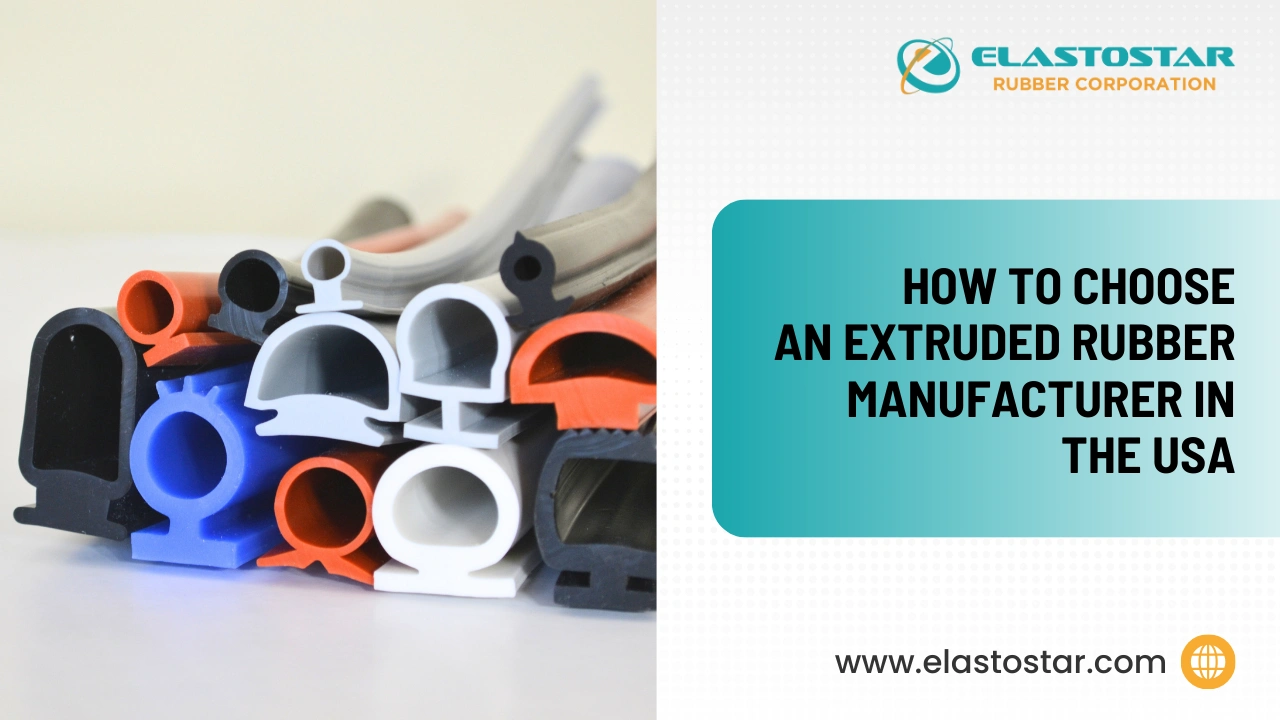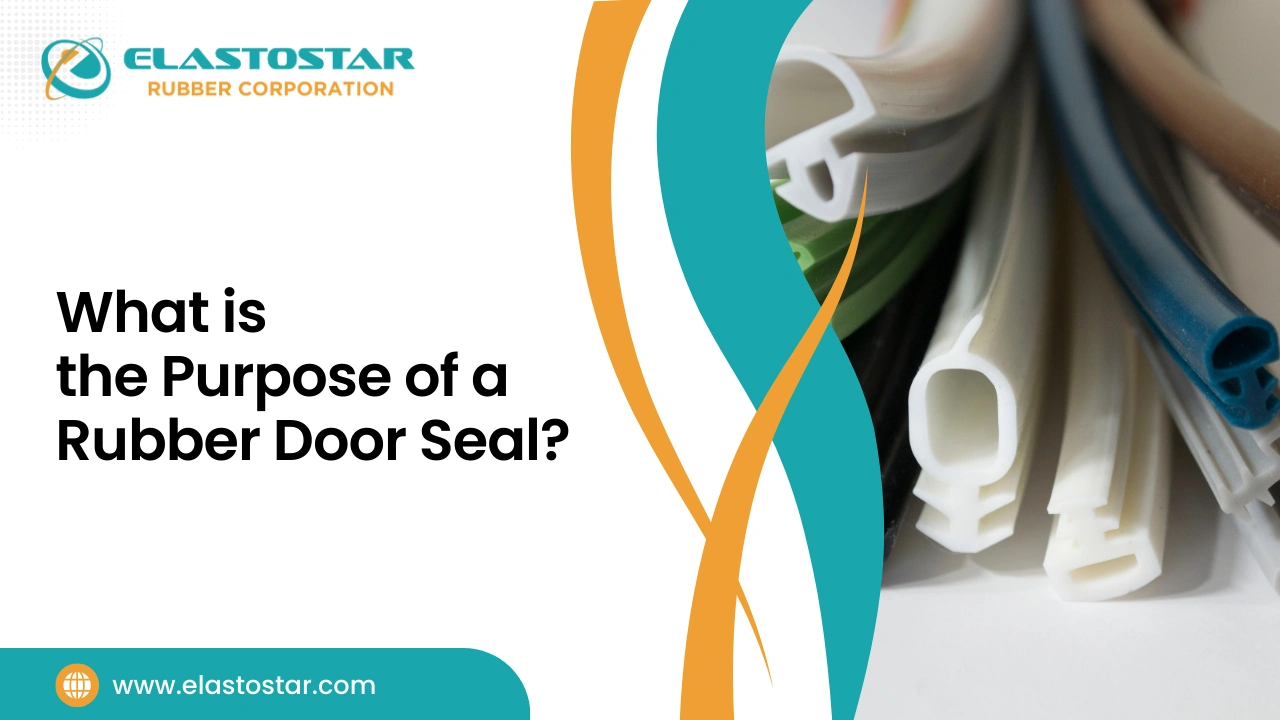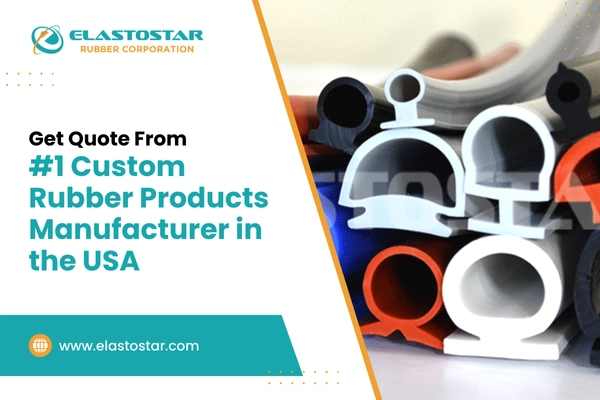Silicone plays an important role in electronics manufacturing because of its versatility and durability, especially in challenging environments. With resilience against extreme temperatures, moisture, and vibration, electronic silicone is widely used to protect and enhance electronic components. At Elastostar Rubber Corporation, we specialize in high-quality silicone products for the electronics industry, including custom silicone rings, silicone tubing, and other specialized solutions.
Our products provide reliable performance, making us a trusted partner for manufacturers seeking durable and effective electronic silicone solutions.
Table of Contents
Benefits of Using Silicone in Electronics Manufacturing
Silicone offers a range of benefits that make it an ideal material for electronics manufacturing. Its unique properties provide durability, flexibility, and protection, ensuring that electronic components function reliably under various conditions.
- Temperature Resistance: One of the top benefits of silicone is its ability to perform across a wide range of temperatures, making it suitable for devices exposed to extreme heat or cold.
- Sealing and Protection: Silicone applications include excellent sealing against moisture, dust, and other environmental contaminants, which helps to extend the life span of sensitive electronics.
- Electrical Insulation: Silicon in electronics offers superior insulation properties, making it perfect for preventing electrical interference and protecting circuits.
- Vibration and Shock Absorption: Electronics silicone is highly effective at reducing vibrations and absorbing shock, which protects delicate components in both industrial and consumer devices.
- Versatility: Due to its adaptability, silicone uses span a wide range of applications, from sealing and insulating to protecting electronic components.
These uses of silicones make it a preferred material in the industry, enhancing the reliability and longevity of electronic products.
Top 7 Applications of Silicone in Electronics Manufacturing

Silicone is essential in electronics manufacturing, offering durability, insulation, and protection across a variety of applications.
Here are the top 7 ways silicone is used to enhance and protect electronic components.
1. Thermal Management and Heat Dissipation Solutions
In electronic devices, managing heat is critical to ensure components work efficiently and safely. Silicone materials, such as silicone foam and thermal pads, help dissipate heat effectively, keeping devices at safe operating temperatures. Discover why heat-resistant silicone is a popular choice in thermal applications.
- Examples: We use silicone pads, gels, and silicone tubing for reliable thermal management, which are commonly applied in devices that generate substantial heat.
2. Gasket and Sealing Solutions
Silicone provides excellent gasket and sealing solutions to protect electronic components from external elements. A durable silicone sponge and other silicone products are ideal for creating seals that block out moisture, dust, and other contaminants.
- Applications: Our silicone tubing and silicone ring gaskets are commonly used to safeguard electronics from moisture and environmental exposure, which helps extend the life span of the components.
3. Electrical Insulation and Dielectric Properties
One of silicone’s standout qualities is its ability to insulate electrical components, preventing electrical interference, and ensuring safe operation. Silicone is highly reliable as an electrical insulator in various critical applications.
- Use Cases: We apply sponge rubber for added shock absorption and silicone tubing for wiring insulation in circuit boards. These materials help prevent electrical issues and improve the longevity of electronic systems.
4. Vibration Dampening and Shock Absorption
Electronics, especially in vehicles and industrial machinery, are often exposed to vibrations that can wear down or damage delicate components. Silicone materials, like silicone sponge and sponge rubber, are excellent for absorbing shock and dampening vibrations, adding a layer of protection.
- Examples: Silicone sponge and sponge rubber are widely used in automotive electronics and heavy-duty industrial equipment to ensure components are protected from the impact of vibrations.
5. Moisture and Corrosion Protection
Electronics exposed to moisture risk corrosion and damage, leading to malfunctions. Silicone is resistant to water and other environmental factors, providing a protective barrier for sensitive electronics.
- Applications: Silicone tubing and silicone foam are popular choices in marine electronics and outdoor equipment, where they protect delicate parts from moisture and prevent corrosion, helping devices withstand harsh conditions.
6. Display Protection and LCD Gaskets
Fragile screens and displays are vulnerable to damage from impact, moisture, and dust. Silicone ring gaskets offer durable protection for displays in various devices, adding resilience and extending their life.
- Examples: Our silicone products are commonly used to safeguard screens on devices like smartphones, tablets, and other electronics, providing impact resistance and environmental shielding.
7. Encapsulation and Potting for Component Protection
Encapsulating sensitive components with silicone foam or potting compounds shields them from dust, moisture, and mechanical stress. This is especially important for protecting circuits and sensors in challenging conditions.
- Examples: We use silicone potting compounds to encapsulate sensors and other sensitive parts, which keeps them secure and functioning reliably in a range of demanding environments.
| Application | Silicone Products Used |
| Thermal Management | Silicone pads, gels, tubing |
| Gasketing and Sealing | Silicone sponge, tubing, ring gaskets |
| Electrical Insulation | Sponge rubber, silicone tubing |
| Vibration Dampening | Silicone sponge, sponge rubber |
| Moisture Protection | Silicone tubing, silicone foam |
| Display Protection | Silicone ring gaskets |
| Encapsulation and Potting | Potting compounds, silicone foam |
Why is Silicone a Leading Material Choice in Electronics?
Silicone stands out as a preferred material in electronics manufacturing due to its unique properties and adaptability across various forms.
- Material Properties: Silicone’s adaptability allows it to be formed into various types, including silicone foam, silicone sponge, and silicone ring gaskets. Each form brings unique benefits—silicone foam is ideal for thermal management, silicone sponge excels in vibration dampening, and silicone gaskets provide strong sealing.
- Its resilience to extreme temperatures, flexibility, and resistance to moisture and chemicals make silicone highly reliable in demanding electronic applications.
- Comparison with Other Materials: Compared to materials like rubber and plastic, silicone offers greater stability and long-term performance. Rubber, while effective in shock absorption, often lacks silicone’s ability to withstand high temperatures and environmental stress.
- Plastics may insulate but can degrade over time with exposure to heat and chemicals. Silicone products maintain their integrity, providing consistent protection and durability, making them a preferred choice in electronics manufacturing.
Industry-Specific Applications of Silicone in Electronics
Silicone’s versatility makes it indispensable across various industries, offering customized solutions for specific electronic needs.
- Automotive & EV/HEV: In electric vehicles, sponge rubber and silicone tubing are essential for shock absorption and reliable sealing, protecting sensitive components from vibrations and environmental exposure.
- Medical Devices: Platinum-cured silicone tubing is highly suited for medical electronics, offering exceptional purity and hygiene, making it ideal for devices that require biocompatibility and resistance to frequent cleaning.
- Renewable Energy (Solar & Wind): Silicone foam and silicone ring gaskets are widely used to provide long-lasting environmental protection, helping solar panels and wind energy equipment withstand extreme temperatures, UV exposure, and harsh outdoor conditions.
- Consumer Electronics: Custom silicone rings and other silicone products are frequently used in wearable devices, mobile phones, and tablets, where they provide impact protection, environmental sealing, and flexibility for lightweight, user-friendly designs.
- Industrial Electronics: For heavy-duty applications, silicone sponge and sponge rubber are essential in machinery and industrial electronics, offering high durability for vibration dampening and reliable protection in challenging environments. Learn more about the benefits and applications of sponge silicone rubber products.
Elastostar Rubber Corporation’s Role in Advanced Silicone Solutions
At Elastostar Rubber Corporation, we pride ourselves on providing specialized silicone solutions customized to the unique demands of the electronics industry.
- Elastostar’s Expertise: We offer custom-designed silicone ring gaskets, silicone tubing, and custom silicone rings specifically engineered to enhance performance and durability in electronic applications.
- Unique Offerings: Our wide range of silicone products includes silicone foam and silicone sponge, which can be customized to meet each client’s specifications, ensuring optimal protection and functionality in even the most challenging environments.
How to Choose the Right Silicone Solution for Your Electronics Project
Choosing the right silicone solution is essential for achieving durability and reliability in electronics.
- Factors to Consider: When selecting silicone products like silicone foam or silicone sponge, consider factors such as environmental exposure, temperature range, and required resilience. These properties ensure that the chosen product can handle specific demands like heat dissipation, shock absorption, or moisture sealing, tailored to the application.
- Collaborating with Elastostar: At Elastostar, we provide personalized guidance to help clients choose the most effective silicone solutions, such as custom silicone rings, silicone tubing, and specialized gaskets. Our expertise ensures each product is optimized for your project’s unique requirements, maximizing both functionality and lifespan in electronics.
Recommended Reads
- What Makes Heat-Resistant Silicone So Popular?
- Difference Between Closed-Cell Silicone Sponge vs. Dense Silicone Rubber
- Advantages of Platinum-Cured Silicone Tubing

Conclusion
Silicone continues to be a cornerstone material in electronics manufacturing, appreciated for its versatility, durability, and ability to meet complex demands. Products like silicone sponges, silicone tubing, and silicone ring gaskets provide benefits such as heat resistance, environmental sealing, insulation, and vibration dampening. These qualities enhance the performance and lifespan of electronic devices across industries like automotive, medical, and consumer electronics. As technology advances, silicone’s adaptability ensures it will remain a major contributor to innovative and reliable electronic solutions.
FAQs
1. What is silicone used for in electronics?
At Elastostar Rubber Corporation, we provide silicone solutions that are essential in electronics for sealing, insulation, thermal management, and vibration dampening. Our products, like custom silicone gaskets and tubing, protect sensitive electronic components from heat, moisture, and physical stress.
2. What is the use of silicon in the electronic industry?
Silicon is primarily used to make semiconductors and microchips, which are essential for the operation of computers, smartphones, and many other electronic devices.
3 . Can you use silicone on electronics?
Yes, and we at Elastostar specialize in providing silicone products specifically designed for electronics. Our silicone materials are non-conductive, heat-resistant, and highly durable, making them ideal for protecting components from environmental factors.
4. How is silicon used in phones?
Silicon in phones is mainly used in the form of microchips and semiconductors, enabling data processing and storage functions in smartphones.
5. What is a common use for silicon in technology?
A common use of silicon in technology is in the production of semiconductors, which power most electronic devices, from computers to mobile phones.
6 . What are the main uses of silicone in electronics?
Our silicone is primarily used for insulation, gaskets, thermal management, and as a protective barrier on delicate components in electronics. Elastostar’s custom silicone solutions are crafted to meet the exact requirements of each electronic application, ensuring reliable performance and longevity.
7. What are some daily applications of silicone in electronics?
Daily applications include its use in protecting phone screens, insulating cables, sealing device enclosures, and managing heat in high-performance electronics.




